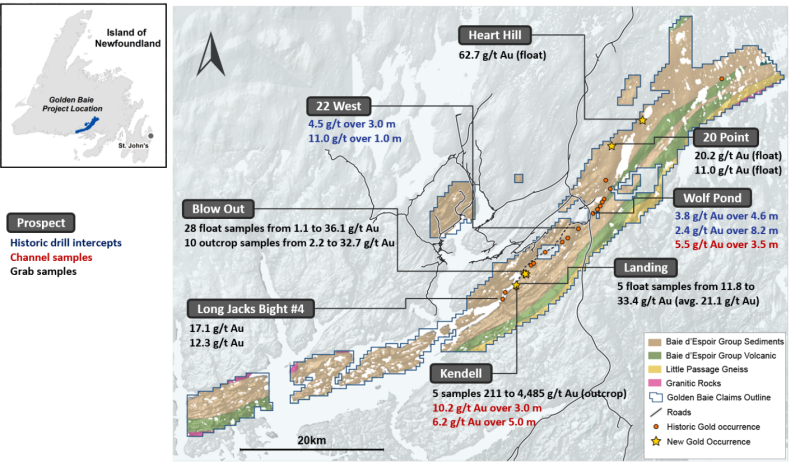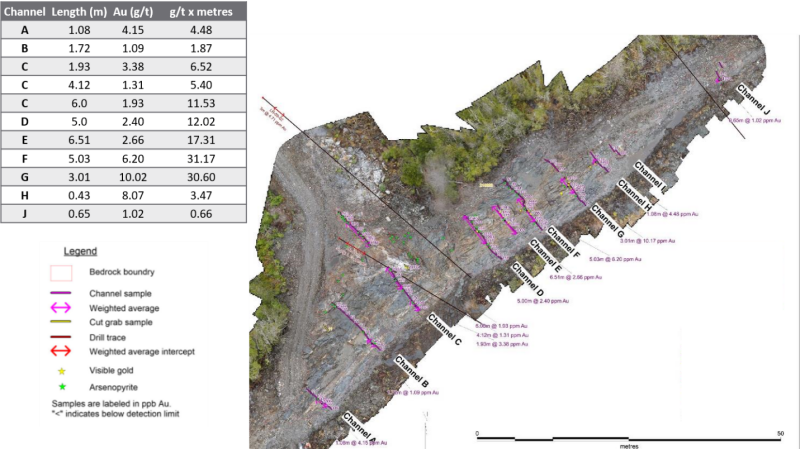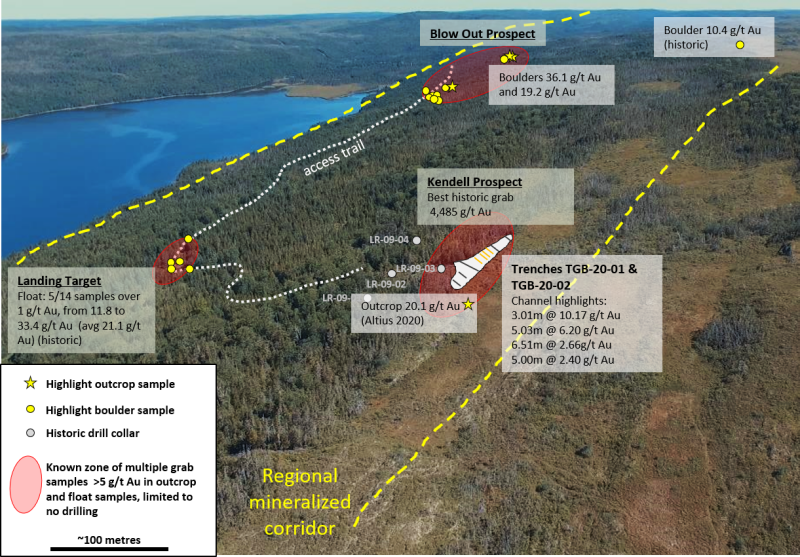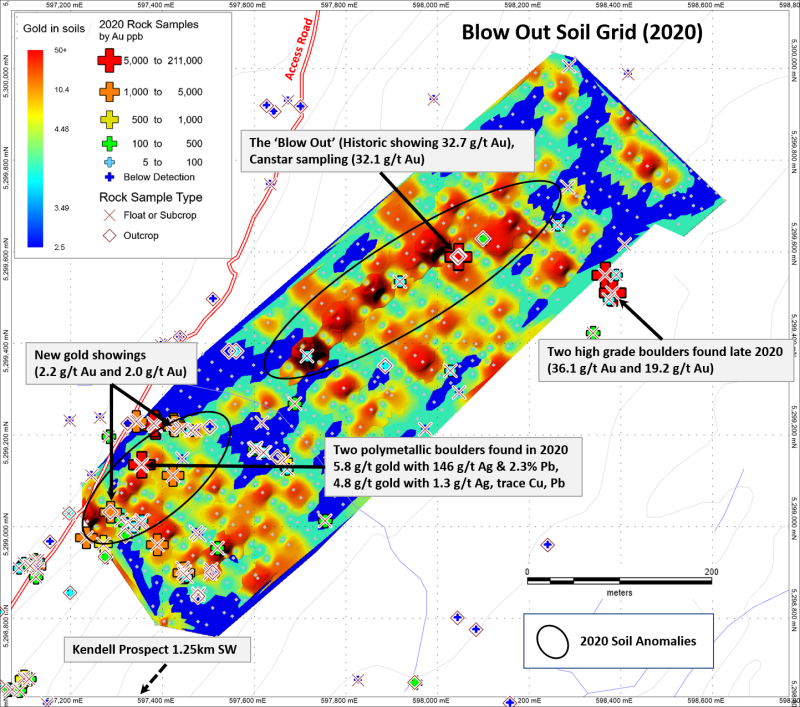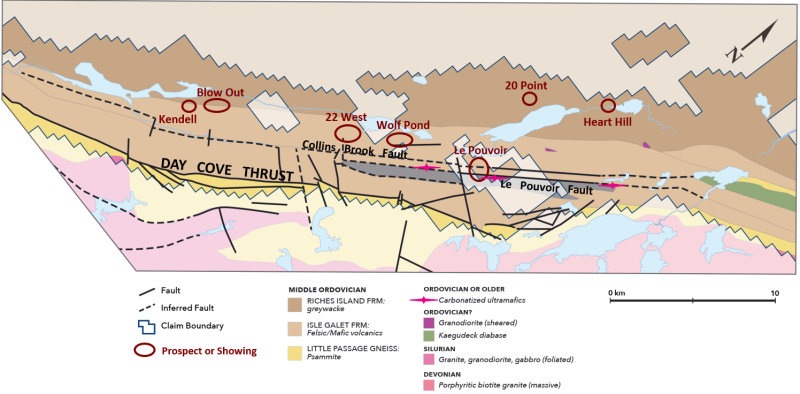

Highlights:
-
- $1.5 million exploration program includes diamond drilling, trenching, and regional exploration on the Golden Baie Project, a large claim package in southern Newfoundland that is highly prospective for orogenic gold mineralization.
- Drilling is expected to commence by early June and will focus on the Kendell Prospect and the Blow Out Prospect, building on the field work from 2020.
-
- The Kendell Prospect has the best grab samples (up to 4,485 g/t gold) and the best trench intercepts encountered on the Project to date.
- The Blow Out Prospect area has multiple gold occurrences at surface grading up to 32 g/t gold and gold-in-soil anomalies spanning over 1,200 metres along strike by up to 300 metres wide.
- Ground magnetic surveys have been completed in the Kendell and Blow Out areas to aid with structural interpretation and trenching to refine drill targets is permitted and underway.
- Regional exploration will evaluate the more remote claim blocks of the 62,175 hectare property in an effort to extend the strike length of surface gold occurrences defined to date, which currently span approximately 40 km on the Golden Baie property.
-
Toronto, Ontario – TheNewswire - May 25, 2021 – CANSTAR RESOURCES INC. (TSXV:ROX) & (OTC:CSRNF) (“Canstar” or the “Company”) is pleased to announce details of its 2021 exploration program on the Golden Baie Project in southern Newfoundland. The exploration program is budgeted for $1.5 million and will include at least 2,500 metres of diamond drilling, which will be the first drilling on the property in over a decade. Subject to receipt of drill permits, drilling using a track-mounted drill rig is expected to commence by early June and continue into July. This allows for a potential second phase of the 2021 field program, if warranted by drill results from the first phase of drill testing.
Exploration Objectives
The 2021 exploration program was designed with two primary objectives:
-
1.Drill testing of the priority Kendell and Blow Out prospect areas - These two areas, which are approximately 1.25 km apart in the central portion of the Golden Baie property (see Figure 1), have only five shallow historic drill holes. Recent surface exploration results have made these areas the top drill targets due to the discovery of multiple styles of gold mineralization, including free gold in quartz veins, and due to the extent of gold mineralization based on grab sampling and gold-in-soil anomalies. Drilling will follow trenching work to expose veins and provide a better understanding of structural controls and lithology.
-
2.Grass roots exploration and target generation on remote claims - Some of the claim blocks that comprise the Golden Baie Project are remote and have seen little or no historical exploration even though they have similar lithology and proximity to the Day Cove Thrust fault like the other gold occurrences identified at Golden Baie. A LiDAR survey is planned to identify regional structures and will be supplemented by lake sediment sampling, grass roots prospecting work, and geochemistry.
Rob Bruggeman, CEO of Canstar, stated: “Our exploration team is excited to be back out in the field at Golden Baie after a short but productive field season in late 2020. Our understanding of the Golden Baie property has advanced substantially since last fall due to compilation of considerable historical data, much dating from the 1980s, analysis of last year’s results, and detailed ground magnetic surveys that were recently completed at the Kendell and Blow Out prospects. A key focus of this year’s program will be to identify broader widths of gold mineralization and to vector in on potential high grade gold zones associated with orogenic style gold mineralization.”
Figure 1 - Golden Baie claims map with known gold occurrences
Kendell Prospect
The Kendell Prospect is located in the central portion of the Golden Baie property. It is a high priority target for drilling because grab samples from Kendell contain the highest grades of gold mineralization encountered on the property to date. It was in the Kendell area in 2019 that the visible gold was first discovered on the Golden Baie property, with historical1 grab samples assaying up to 4,485 g/t gold. Canstar’s 2020 prospecting at Kendell identified multiple outcrop and float samples with visible gold in quartz stockwork and quartz breccia associated with intense silicification. (Note: the reader is cautioned that rock grab samples are selective by nature and values reported may not represent the true grade or style of mineralization across the property.)
Two sequential trenches excavated in the Kendell area in 2020 uncovered quartz veins extending approximately 70 metres along strike (Figure 2). Channel sampling of the trench included intercepts of 10.0 g/t gold over 3.0 metres (channel G) and 6.2 g/t gold over 5.0 metres (channel F) in trench TGB-20-01. Channel cut C is also of significant interest, as it encountered multiple mineralized intervals in the vicinity of two quartz veins that appear to have undergone significant deformation and faulting. The vein structure encountered in trenches TGB-20-01 and TGB-20-02 may continue along strike based on rock and soil samples as well as ground magnetics, so these trenches are currently being extended.
At least six short drill holes are planned at Kendell to evaluate the dip and vertical continuity of the veins encountered in trenches TGB-20-01 and TGB-20-02. Drill holes will test for the vertical continuation of mineralization identified at surface and advance the understanding of structural controls on gold mineralization.
Figure 2 - Kendell trenches TGB-20-01 and TGB-20-02
Landing Target
The Landing Target is located approximately 250 metres to the north northwest of the Kendell Prospect (Figure 3). Five out of fourteen historic float samples along an access trail in this location graded over 1 g/t gold, ranging from 11.8 to 33.4 g/t gold (averaging 21.1 g/t gold). This area is wooded with little or no outcrop, so there has been minimal exploration. Trenching is planned at the Landing Prospect to attempt to identify the source of the float samples (primarily angular boulders) along with additional prospecting work. At least two drill holes are planned to test this area.
Blow Out Prospect
The Blow Out Prospect is located approximately 1.25 km NE of the Kendell Prospect. A 1,450 x 400 metre soil sampling grid on 50 metres spacing completed in November 2020 indicated several anomalies with gold values up to 255 ppb gold along over 1 km along strike and up to 300 metres wide (Figure 4). This soil grid is being expanded in the 2021 exploration program as two boulders grading 19.2 g/t gold and 36.1 g/t gold were discovered outside of the soil grid in late 2020. The soil sampling will also be extended to the southwest, where additional gold mineralization has been identified along strike. The size of the soil-in-gold anomalies and corresponding rock samples with gold mineralization grading up to 36 g/t gold make this area one of the priority targets for advanced exploration in 2021.
Figure 3 - Drone photo of the Golden Baie property near the Kendell and Blow Out Prospects, looking northeast
A ground magnetic survey recently completed by Canstar has aided the structural interpretation of the Blow Out Prospect. There is ~500 metre wide magnetic high corridor that trends NE-SW, parallel to the Day Cove Thrust fault. Interpreted east-west structures that are oblique to the main regional trend may help explain the clusters of grab samples with anomalous gold mineralization. Trenching and drilling will evaluate the continuity and orientation of gold mineralization in this area with at least ten drill holes planned. Initial drill holes will be short in order to confirm the vertical continuity of mineralization identified at surface. If warranted by the initial drill holes, steeper and deeper holes will be drilled to test the continuity, thickness and grade of gold mineralization.
Canstar wishes to acknowledge its deep appreciation to the Government of Newfoundland and Labrador for the airborne geophysical surveys conducted across most of the Golden Baie property. The surveys and maps provided are extremely beneficial to junior exploration companies like Canstar. We would also like to acknowledge the Government of Newfoundland and Labrador’s financial support of the 2021 exploration program through the Junior Exploration Assistance Program.
Figure 4 - Gold in soil anomalies and rock samples at the Blow Out Prospect
Golden Baie Project Overview
The Golden Baie Project has mineral occurrences at surface spanning 40 km along strike (Figure 1). The mineralization generally occurs subparallel to a major regional thrust fault, the Day Cove Thrust, in rocks associated with metasedimentary and metavolcanic rocks of the Bay d’Espoir Group in the Dunnage Zone (Figure 5). The Day Cove Thrust is believed to be the tectonic boundary between the Exploits Subzone of the Dunnage Zone and the Gander Zone in southern Newfoundland and it may be a continuation of the Gander River Ultramafic Belt (“GRUB line”) to the north.
The Golden Baie property has undergone major deformation as evidenced by mylonitization of the Baie d’Espoir Group extending several kilometres to the northwest from the Day Cove Thrust, across the Golden Baie property. Regional structures, such as the Collins Brook and Le Pouvoir faults, run subparallel to the Day Cove and there are defined and inferred secondary structures that are oblique to the regional faults. Deep rooted mineralizing fluids are believed to have used these structures as conduits and are important for guiding exploration efforts to areas with potentially higher grades or larger volumes of gold mineralization.
Figure 5 - Golden Baie simplified lithology map with key faults (based on work by Evans, 1996, and Dickson, 1988)
QAQC:
All rock and soil samples were collected by company personnel and sent to Eastern Analytical of 403 Little Bay Road, Springdale, NL, a commercial laboratory that is ISO/IEC 17025 accredited and completely independent of Canstar Resources Inc. Most rock samples were crushed to 10 mesh (2000 μm) and a 250g split pulverized to 150 mesh (89 μm). The 2020 channel samples were entirely pulverized to 150 mesh (89 μm). Splits of the pulverized samples were analyzed for gold using fire assay (30g) with AA finish and an ICP-34, four acid digestion followed by ICP-OES analysis for 34 additional elements. Soil samples were dried and sieved to 80 mesh (177 μm) and a split analyzed for gold using fire assay (30g) with AA finish and an ICP-34, four acid digestion followed by ICP-OES analysis for 34 additional elements. In addition to Eastern Analytical’s quality control program of standards, blanks and duplicates, Canstar utilizes its own reference materials to ensure data quality.
Qualified Person
Bob Patey, B.Sc., P.Geo, Senior Geologist of Canstar, and a Qualified Person as defined by National Instrument 43-101 - Standards of Disclosure for Mineral Projects, is responsible for the scientific and technical data presented herein and has reviewed and approved this release.
About Canstar Resources Inc.
Canstar is focused on the discovery and development of economic mineral deposits in Newfoundland and Labrador, Canada. Canstar has an option to acquire a 100% interest in the Golden Baie Project, a large claim package (62,175 hectares) with recently discovered, multiple outcropping gold occurrences on a major structural trend in south-central Newfoundland. The Company also holds the Buchans-Mary March project and other mineral exploration properties in Newfoundland. Canstar Resources is based in Toronto, Canada, and is listed on the TSX Venture Exchange under the symbol ROX and trades on the OTCPK under the symbol CSRNF.
For further information, please contact:
Rob Bruggeman, President & CEO
Email: rob@canstarresources.com
Phone: 1-416-884-3556
Forward-Looking Statements
Neither TSX Venture Exchange nor its Regulation Services Provider (as that term is defined in the policies of the TSX Venture Exchange) accepts responsibility for the adequacy or accuracy of this release.
This News Release includes certain "forward-looking statements" which are not comprised of historical facts. Forward looking statements include estimates and statements that describe the Company’s future plans, objectives or goals, including words to the effect that the Company or management expects a stated condition or result to occur. Forward looking statements may be identified by such terms as “believes”, “anticipates”, “expects”, “estimates”, “may”, “could”, “would”, “will”, or “plan”. Since forward-looking statements are based on assumptions and address future events and conditions, by their very nature they involve inherent risks and uncertainties. Although these statements are based on information currently available to the Company, the Company provides no assurance that actual results will meet management’s expectations. Risks, uncertainties and other factors involved with forward-looking information could cause actual events, results, performance, prospects and opportunities to differ materially from those expressed or implied by such forward-looking information. Forward looking information in this news release includes, but is not limited to, the Company’s objectives, goals or future plans, statements, exploration results, potential mineralization, the estimation of mineral resources, exploration and mine development plans, timing of the commencement of operations and estimates of market conditions. Factors that could cause actual results to differ materially from such forward-looking information include, but are not limited to failure to identify mineral resources, failure to convert estimated mineral resources to reserves, the inability to complete a feasibility study which recommends a production decision, the preliminary nature of metallurgical test results, delays in obtaining or failures to obtain required governmental, environmental or other project approvals, political risks, inability to fulfill the duty to accommodate First Nations and other indigenous peoples, uncertainties relating to the availability and costs of financing needed in the future, changes in equity markets, inflation, changes in exchange rates, fluctuations in commodity prices, delays in the development of projects, capital and operating costs varying significantly from estimates and the other risks involved in the mineral exploration and development industry, an inability to predict and counteract the effects of COVID-19 on the business of the Company, including but not limited to the effects of COVID-19 on the price of commodities, capital market conditions, restriction on labour and international travel and supply chains, and those risks set out in the Company’s public documents filed on SEDAR. Although the Company believes that the assumptions and factors used in preparing the forward-looking information in this news release are reasonable, undue reliance should not be placed on such information, which only applies as of the date of this news release, and no assurance can be given that such events will occur in the disclosed time frames or at all. The Company disclaims any intention or obligation to update or revise any forward-looking information, whether as a result of new information, future events or otherwise, other than as required by law.
1 Historic samples were not collected by the Company and have not or cannot be verified for accuracy.
Copyright (c) 2021 TheNewswire - All rights reserved.
